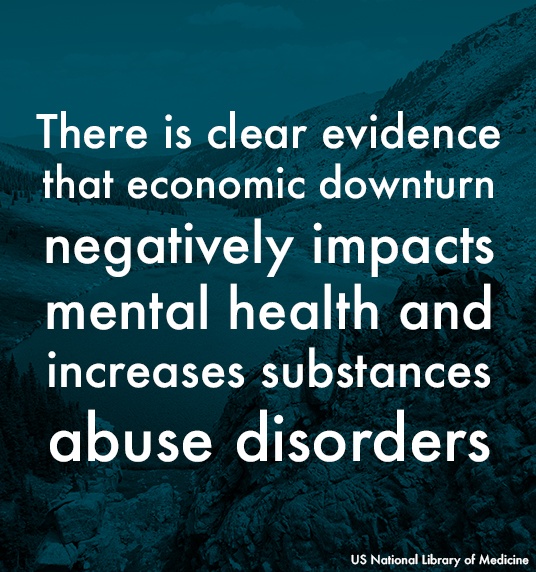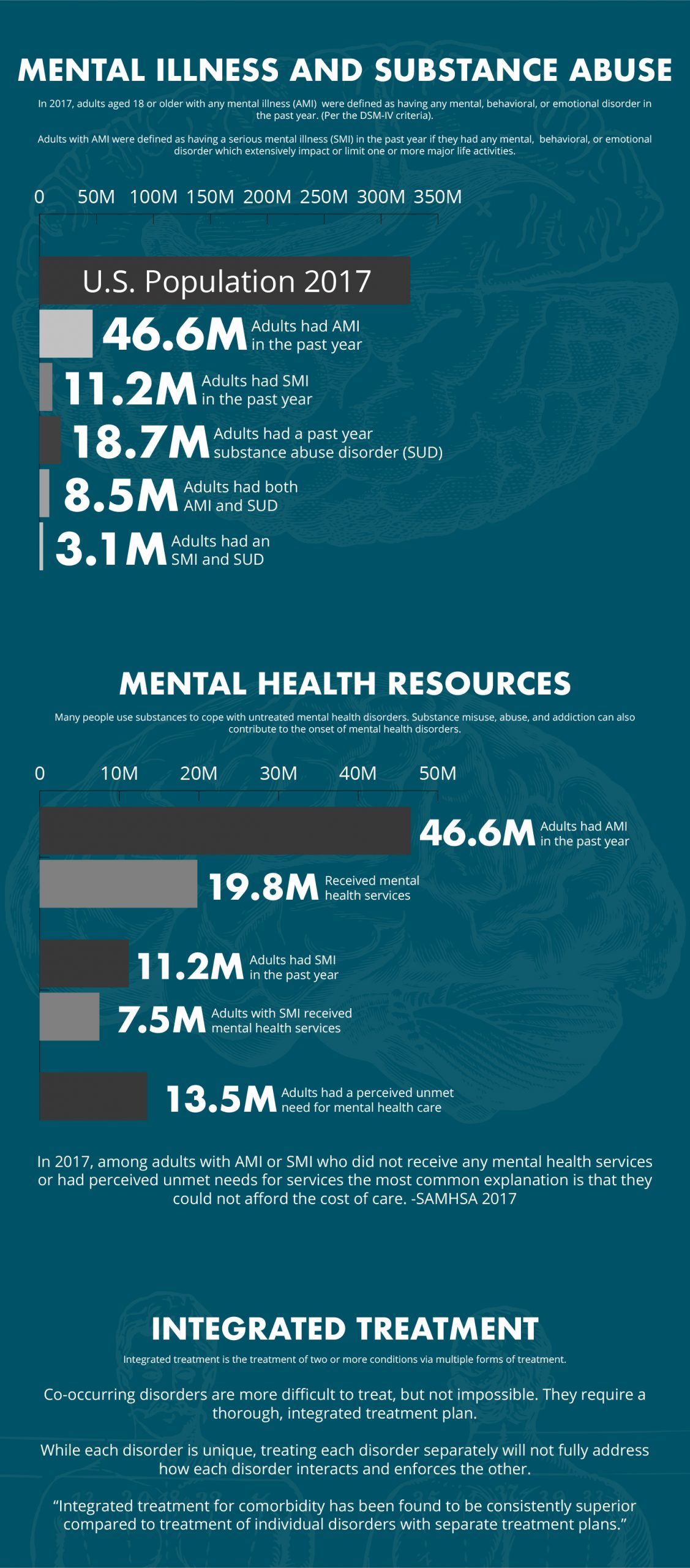Drug Rehab Centers and Mental Health Facilities

Currently, we’re able to treat clients with:
- Depression
- Bipolar Disorder (treated)
- Treated Schizoaffective
- Anxiety/Personality Disorders
- Other Axis II Disorders
In order to effectively treat co-occurring disorders, it’s important for us to understand a person’s background as fully as possible. This means understanding their genetic history and the various environmental factors that impacted them as they grew up. Addiction is complex and unique to each person. Individualized treatment is essential to an effective treatment plan. Thus, it’s important that we work with individuals to understand as much as possible about how their background has impacted their mental health and addiction.

Genetics, Environment, And Mental Health
With family, there’s the possibility a person was adopted, in foster care, or another situation where they rarely lived with their immediate blood relatives. Whatever the case, it is still helpful to look at genetics and understand how that is impacting a person today. If someone is unable to provide any familial genetic history, that is okay and there are still ways to look at how genetics are impacting them.
A person’s environment impacts their potential for mental health problems in a variety of ways:
- Work: Stress from work is a problem for many people. This includes interpersonal relationships at work, high-pressure expectations, jobs that are stressful no matter what, and having time cut or being fired.
- Economic: There is clear evidence that economic downturn negatively impacts mental health.
- Culture: A shared set of beliefs, norms, and values. This impacts people’s ability to address mental health or illness, whether they seek treatment, or if treatment is even easily available.
- Social: A social life impacts mental health; this may be a robust social life, a lack of one, or even a social life that includes negative influences.
Genetic and environmental factors do not tell for certain if someone will have a mental illness. However, they do provide insight into the potential for developing mental health disorders. Family environment and genetics can mix in a variety of ways to impact one’s mental health. Someone could grow up in a dysfunctional family with or without a genetic predisposition for mental illness; alternatively they could grow up in a well-adjusted family that still has a higher risk for certain mental illnesses. It’s possible for any mix of these situations to impact a person’s mental health.
MountainView Recovery
5475 Mark Dabling Blvd #102
Colorado Springs, Co 80918
Contact Us Today!
MountainView Resources!
Genetics, Environment, And Addiction

Environmental factors influence addiction in a number of ways:
- Work: Many people use substances to cope with stress related to the work itself or interpersonal relationships.
- Economic: In addition to economic downturn causing negative mental health affects, it also leads to increases in substance abuse disorders. Many people use substances to cope with the negative mental health affects.
- Additionally, the economic background someone is raised in has a significant impact. Are substances widely available? Substances like meth, heroin, and crack cocaine are typically associated with those from poorer economic backgrounds. Wealthier economic groups still deal with addiction, and it can also be severe, but they’re not typically substances as addictive as meth, heroin, or crack cocaine.
- Social: Many people try substances out of curiosity and peer pressure. Peer pressure is not always an insidious as it might seem. It could simply be friends or a social group convincing someone to try a substance.
- Abuse: Research studies have shown correlation between abuse and addiction. In particular, those who suffered from childhood abuse were “…1.5 times more likely to report illicit drug use in the past year compared to healthy, nonabused [people]…”
Addiction And Mental Health
Someone seeking treatment for co-occurring disorders may wonder if they will ever achieve a state of sound mental health. It’s important for them, and anyone, to know that it is possible to treat mental health disorders and to significantly improve one’s overall mental health. However, they should also understand that there is no final level of achievement that people reach. Everyone needs to take care of their mental health throughout their lives, including those who are perceived to have great mental health. Mental health resources and addiction resources are not going to cure a disorder, but they can help. They should help someone work through issues through therapy, for their mental and physical health, and provide them with tools to help throughout their life.
At Mountain View Recovery, we also believe and put into practice the idea that group support is essential to recovery. Recovery is complex and something best done with support. With co-occurring disorders, we work to identify and treat as many of the underlying causes as possible. In doing so, we are giving each individual the best possible chance at maintaining sobriety, but also at dealing with relapse if and when it happens. Through therapy like Eye Movement Desensitization and Reprocessing and Somatic Experiences, we work to address traumas that may have caused addiction or resulted from addiction. Outdoor therapy (adventure-based) helps individuals process trauma, achieve new accomplishments, and develop healthy ways to cope with addiction and mental health issues. We also have an alumni program, with no time limit, that provides an opportunity for sober living and meeting with a group twice a week. We know how essential support is in recovery as well as providing means to heal. If you or a loved one needs help, contact us today.

Mountain View Recovery Treatment Programs
Patient Resources
Addiction is complex, which means treatment and long-term recovery are complex. Despite this, it shouldn’t scare anyone – patients or their loved ones. It just means that treatment and recovery both require thorough and thoughtful planning.
Outpatient Program
Our outpatient program (OP) is a transition preparatory phase. It provides a minimum of nine (9) hours of weekly outpatient treatment. This involves a minimum of one (1) hour/s individual substance abuse/behavioral health counseling per week.
Adventure Therapy
For a long time, nature has been seen as a balm to the problems we face in society. Even during pre-industrial times, people would seek out the countryside as a means to feel better. Many people have also used nature as a way to understand the world.
Trauma and Recovery
Just like physical trauma occurs, so does psychological trauma. Any number of traumatizing events occur and cause psychological trauma. A lot of people will experience trauma before or because of addiction. It’s possible for addiction to deepen…
Neurofeedback
Nobody sets out with the intention of becoming addicted to anything. Even someone making a conscious decision to try substances is not intending to become dependent, experience withdrawal, and risk overdose or death. There are numerous factors.
